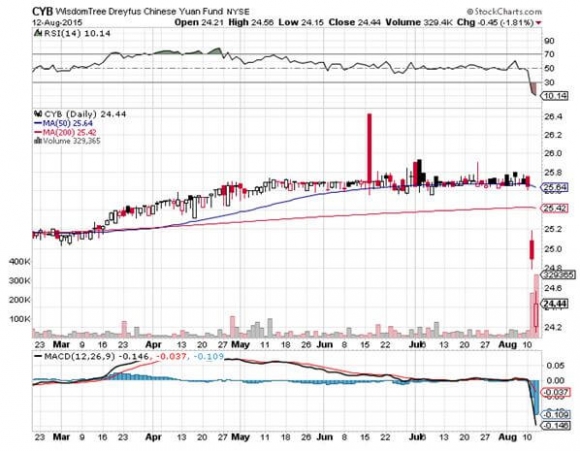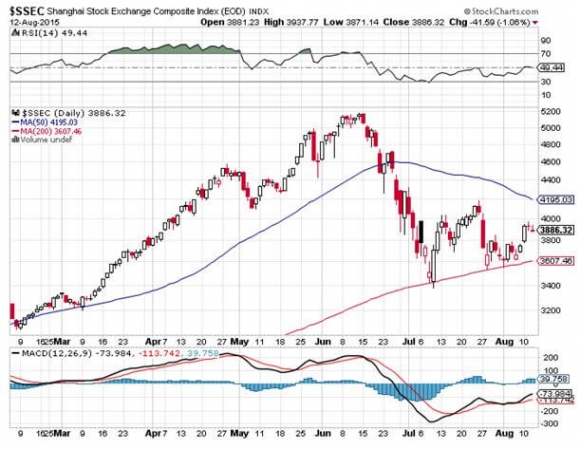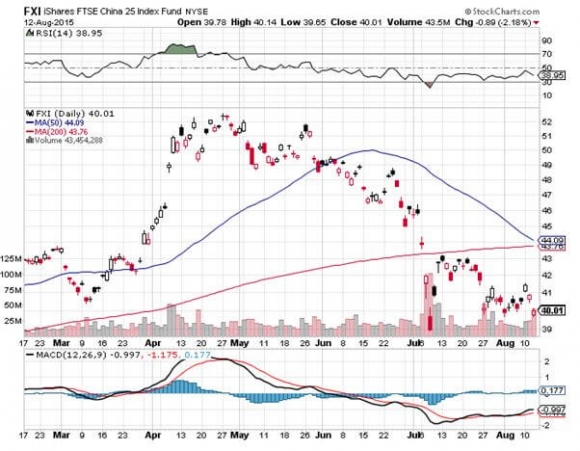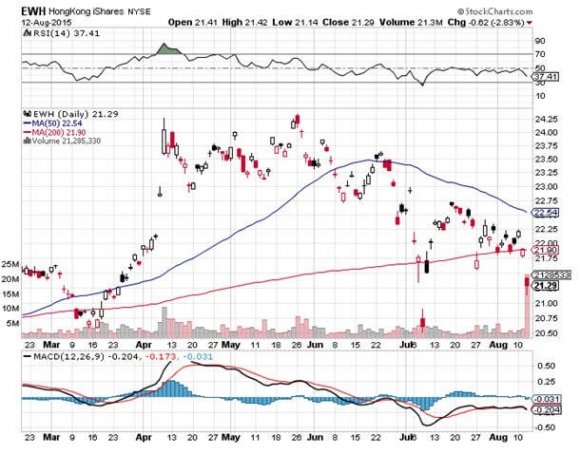China?s Firecracker Surprise
Don?t waste your time trying to analyze financial markets right now.
There is only one ticker symbol you need to know about, that for the Shanghai Stock Exchange Composite Index, the ($SSEC).
When Shanghai goes up, the rest of the world?s risk assets happily join the party. When it drops, ?RISK OFF? fever goes pandemic.
China upped the ante this week when it allowed its currency, the Yuan, or the renminbi as it is known locally (the people?s currency), to float freely for the first time in 25 years. That produced a two-day devaluation of 3.6%.
In the very long history of currency debasements, this one was barely a whimper.
Ancient Sumerians used to shave the edges off of gold and silver coins 5,000 years ago.
When President Nixon took the US off of the gold standard in 1973, the dollar eventually fell 75% against the European currencies.
More recently, the Euro has given up 37% against the greenback, moving from a position of grotesque over valuation to dealing with the Greek credit crisis.
So Beijing?s move this week barely tips the needle in the official history of devaluations.
What it does do is create a giant psychological effect, and therein lies the problem.
Since June, the Mandarins in China have been pulling out all the stops to halt a free fall in the country?s share prices.
It has cut interest rates and relaxed reserve requirements. It banned high frequency trading, blaming the collapse on foreign short sellers (sound familiar?). It has even made stock selling illegal in roughly 94% of the country?s free float.
Still, the bears remain emboldened by their recent success.
By cutting the value of the Yuan, the government is providing a modest boost to the economy. A cheaper currency means less expensive exports and more of them, thus, making local businesses more profitable and creating jobs.
But not by much.
There are not a lot of products that live or die on a 3.6% margin. America has not just lost a chunk of its own exports from the additional competition, contrary to the claims of the TV networks and bogus newsletters with which I compete.
But by taking the first such move to undercut the Yuan in 25 years, it is showing the world how serious a problem is the stock crash.
Will the stock collapse feed into the main economy? Is 10% of the world?s GDP going into a Great Recession? Yikes!
SELL, SELL!
There are a few other problems with the Chinese firecracker.
It violates a secret agreement with the US government, made a decade ago, to allow a steady 3-4% a year appreciation of the Yuan against the dollar.
This was designed to slowly eliminate the artificial under valuation of the Yuan that gave the Middle Kingdom an unfair export advantage. The arrangement was responsible for the 20% rise of the Yuan since 2009.
(Sorry Donald, but you?re holding the chart upside down. Yes, I know, stock charts can be pesky things).
Reneging on the deal is ruffling feathers at the US Treasury in Washington. But it won?t amount to more than that, as long as it is temporary.
Which it will be.
China still has a massive trade surplus with the United States. In 2014, it totaled a staggering $343 billion. It maintained that heady pace, totaling $171 billion during the first half of 2015.
There are an awful lot of Chinese clothes, electronics, and toys sitting on the shelves of American retailers.
Its imports are falling, thanks to the collapse of the price of oil and other bulk commodities.
The natural state of the currency of any country running such huge surpluses is for it to rise in value. That will continue in China?s case for the foreseeable future.
Once the waters settle in the stock market, you can count on the Yuan to regain its upward path.
However, this isn?t going to happen in a day. It could be weeks or months until order returns to Chinese equity markets. Until then, expect some scary days there and here as well.
Compound these problems with the uncertainty over the Federal Reserve?s decision on interest rates in September and slower than expected US growth.
It certainly leaves traders and investors alike, with a full plate of issues to consider.
As if we didn?t have enough to worry about.
For some background on my 45 year coverage of the Middle Kingdom, please click here for my 2011 SPECIAL CHINA ISSUE.








